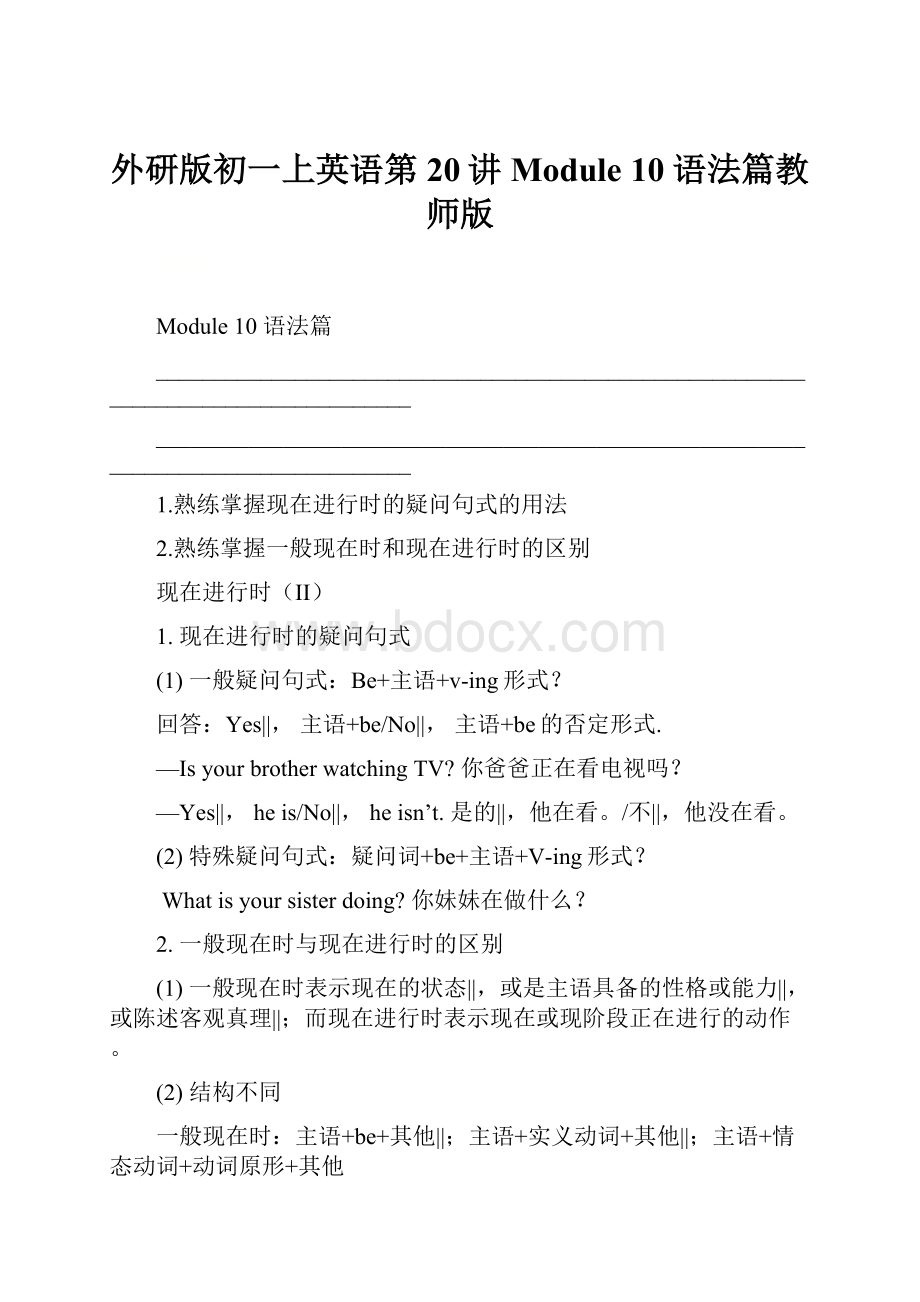 外研版初一上英语第20讲Module 10 语法篇教师版.docx
外研版初一上英语第20讲Module 10 语法篇教师版.docx
- 文档编号:27966408
- 上传时间:2023-07-06
- 格式:DOCX
- 页数:13
- 大小:23.51KB
外研版初一上英语第20讲Module 10 语法篇教师版.docx
《外研版初一上英语第20讲Module 10 语法篇教师版.docx》由会员分享,可在线阅读,更多相关《外研版初一上英语第20讲Module 10 语法篇教师版.docx(13页珍藏版)》请在冰豆网上搜索。

外研版初一上英语第20讲Module10语法篇教师版
Module10语法篇
__________________________________________________________________________________
__________________________________________________________________________________
1.熟练掌握现在进行时的疑问句式的用法
2.熟练掌握一般现在时和现在进行时的区别
现在进行时(II)
1.现在进行时的疑问句式
(1)一般疑问句式:
Be+主语+v-ing形式?
回答:
Yes||,主语+be/No||,主语+be的否定形式.
—IsyourbrotherwatchingTV?
你爸爸正在看电视吗?
—Yes||,heis/No||,heisn’t.是的||,他在看。
/不||,他没在看。
(2)特殊疑问句式:
疑问词+be+主语+V-ing形式?
Whatisyoursisterdoing?
你妹妹在做什么?
2.一般现在时与现在进行时的区别
(1)一般现在时表示现在的状态||,或是主语具备的性格或能力||,或陈述客观真理||;而现在进行时表示现在或现阶段正在进行的动作。
(2)结构不同
一般现在时:
主语+be+其他||;主语+实义动词+其他||;主语+情态动词+动词原形+其他
现在进行时:
主语+be+V-ing形式+其他
(3)时间状语不同
一般现在时:
usually||,often||,sometimes||,always||,everyday||,onceamonth等。
现在进行时:
now||,atthemoment||,thesedays等。
(4)英语中有些动词如hear||,know||,like||,love||,want||,have(拥有)等不可用于现在进行时||,但可用于一般现在时。
(5)现在进行时有时可代替一般现在时||,表示说话人的某种情绪||,使句子具有强烈的感情色彩||,常与always(总是)||,forever(永远)等连用。
Youarealwaysforgettingtheimportantthing.你总是把重要的事情忘掉。
单项选择
1.(北京中考改编)---MayIspeaktotheheadmaster(和校长通话)?
---Heameeting(会)now.CanItakeamessage?
A.ishavingB.hadC.hasD.willhave
2.---Areyoumakingalantern?
---.I'mhelpingmymotherinthekitchen.
A.Yes||,IamB.No||,Idon'tC.No||,I'mnotD.Yes||,Ido
3.---Whereareyourfriends?
---intheplayground.
A.They'replayingB.Yes||,they'replaying
C.No||,theyaren'tplayingD.Theyplay
4.Theycomputergamesintheeveningbecausetheydotheirhomework.
A.areplayingB.aren'tplayingC.don'tplayD.play
5.peopleinMoscowgoingtoworkatthemoment?
A.DoB.IsC.AreD.Can
6.---?
---Theyarehavingsciencelessonsinthelab.
A.Arethestudentshavingsciencelesson
B.Whatarethestudentsdoing
C.Whatdostudentsdointhesciencelab
D.Canthestudentshavesciencelessons
7.---Whoisintheoffice?
---Mr.Green.Heareport.
A.iswriteingB.iswritingC.writingD.wrote
8.---IsLingling'sgrandmothercookingthemeal?
---No||,she.
A.isB.isn’tC.areD.aren’t
解析及答案:
1.找关键词法。
由now可知本句时态应为现在进行时||,故选A。
2.现在进行时的一般疑问句用be动词来提问||,就用be动词来回答||;通过答语的下半句判定是否定回答||,故选C。
3.特殊疑问句不用Yes或No来回答||;用现在进行时态提问应用现在进行时态回答||,故选A。
4.通过后半句动词do可判定上文也用一般现在时||,根据句意用否定形式。
故选C。
5.由going和atthemoment可知应用助动词be||;people为集合名词||,故选C。
6.由答语用现在进行时可知问句也应用现在进行时来提问||,由答语没用Yes或No作答||,可知问句是特殊疑问句。
故选B。
7.由对话的情景可知||,此处应使用现在进行时||,即iswriting||,故选B。
8.前面用了No||,后面也应使用否定形式||,she是第三人称单数形式||,故选B。
基础演练
一、适当形式填空(单句适当形式)
1.Heoften (go)shoppingonSundays.
2.Wealways (have)agoodtimeonChildren'sDay.
3.He (notlike)learningEnglish.
4.It'saChineselesson.Thestudents (write)intheclassroom.
5.--- DannyandJenny (run)now?
---No||,theyaren't.
6.Listen!
Thebird (sing)inthetree.
7.---It'snineo'clock.What XuMei (do)?
---She (learn)English.
8.SpringFestival (finish)atLanternFestival.
答案:
1.goes2.have3.doesn'tlike
4.arewriting5.Are||,running6.issinging
7.is||,doing||;islearning8.finishes
二、适当形式填空(补全对话)
A:
Areyoubusy||,Jenny?
B:
Yes||,I1. (send)anemail.Ialways2. (send)anemailtomyfriendLily.
A:
Whatareyoudoing||,Mum?
C:
I3. (cut)upthetomatoesinthekitchen.
A:
Then||,4. (be)myfatherthere?
C:
No||,he5. (wash)hiscarinthegarden.
答案:
1.amsending2.send3.amcutting
4.Is5.iswashing
巩固提高
三、按要求转换句型
1.WuNaiswatchingafootballmatchnow.(改为一般疑问句并作否定回答)
WuNa afootballmatchnow?
||,she .
2.He'scookingthemealinthekitchen.(对划线部分提问)
he inthekitchen?
3.Grandpaoftenmakesredlanterns.(改为现在进行时)
Grandpa redlanterns.
4.Thegirlsaresinginginthehall.(改为一般疑问句||,并作肯定回答)
thegirls inthehall?
Yes||, .
5.Everyoneisplayinghappily(高兴地).(改为同义句)
Everyoneis agood .
6.MybrothersarewatchingTV.(改为否定句)
Mybrothers TV.
7.DoeshesurftheInternetathomeeveryday?
(用atthemoment改写句子)
he theInternetathomeatthemoment?
答案:
1.Is||,watching||;No||,isn't
2.Whatis||,doing
3.ismaking
4.Are||,singing||;theyare
5.having||,time
6.aren'twatching
7.Is||,surfing
一、单项选择
1.LiMing'sfatheris worknow.
A.
at
B.
for
C.
to
D.
with
2.--- atthemoment?
---They'rehavingbreakfast.
A.
Whatdohisbrothersdo
B.
Wherearehisbrothers
C.
Whatarehisbrothersdoing
D.
Howarehisbrothers
3.TheGreatWallisgreat.Lotsofpeople iteveryyear.
A.
arevisiting
B.
look
C.
visit
D.
arelooking
4.HisfamilygotoHainaneveryyearon sameday.
A.
a
B.
an
C.
the
D.
/
5.---Hello!
CanIspeakto(和……通话)Tony?
A.
I'mTony
B.
MynameisTony
C.
ThisisTony
D.
It'sme
6.---Wouldyoulike footballwithus?
---Sure.Ilike footballverymuch.
A.
toplay||;playing
B.
playing||;play
C.
toplay||;toplaying
D.
playing||;toplay
7.Look!
Allthestudentsarebusy.Theyare thefinalexam(期末测试).
A.
lookingfor
B.
gettingreadyfor
C.
askingfor
D.
leavingfor
8.FatherChristmasalways thechildrenpresents.
A.
give
B.
gives
C.
isgiving
D.
giving
9.Don'ttalkhere.Thebaby .
A.
sleep
B.
issleeping
C.
aresleeping
D.
sleeping
10. thestudents tomusicatthemoment?
A.
Do||;listen
B.
Does||;listen
C.
Are||;listening
D.
Are||;listen
答案:
1-5ACCCC6-10ABBBC
二、完形填空
SpringFestivalistheChineseNewYear'sDay.Itusuallycomes1 JanuaryorFebruary.EveryoneinChina2 SpringFestivalverymuch.WhenSpringFestival3 ||,LiHongusually4 hisparentscleantheirhouseand5 someshoppingandotherhousework.Onthat6 everyoneinChinaeatsdumplings||,NewYear'scakesandothergood7 .LiHonglikesNewYear'scakes.ButWangHaisaysdumplingsare8 favouritefood.TheChinesepeople
9 theNewYear'scakesanddumplingsintheirhouses.How10 theyare!
1.
A.
after
B.
on
C.
in
D.
by
2.
A.
has
B.
like
C.
remembers
D.
likes
3.
A.
goes
B.
comes
C.
reaches
D.
hears
4.
A.
helps
B.
makes
C.
gets
D.
takes
5.
A.
buys
B.
does
C.
goes
D.
carries
6.
A.
morning
B.
evening
C.
day
D.
afternoon
7.
A.
food
B.
drinks
C.
vegetable
D.
fruit
8.
A.
he
B.
his
C.
him
D.
she
9.
A.
findout
B.
buy
C.
eat
D.
sell
10.
A.
happy
B.
happily
C.
lovely
D.
great
答案:
1-5CDBAB6-10CABCA
_________________________________________________________________________________
_________________________________________________________________________________
一、阅读理解
A
OnNewYear'sEve||,peopleinItaly(意大利)throwout(扔掉)alltheoldthings||,sotherearechairs||,beds||,clothesandplatesinthestreets.InSpain(西班牙)||,theNewYearcomesmorequietly.Intheeveningpeoplecometogethertothestreets.Eachholdsabagofgrapes(葡萄).Whentwelveo'clockcomes||,peoplestarteatingthegrapes.
InJapan(日本)||,peopleeatnoodlesonNewYear'sEve.Thisfoodissaidtobringlonglife(长寿).Earlythenextmorning||,somefamiliesclimbMountFuji.Theretheywatchthefirstsunrise(日出)oftheNewYear.
1.ThisstoryisaboutNewYear'sEvein .
A.
Italy
B.
Spain
C.
Japan
D.
alloftheabove(以上所有的)
2.PeopleinSpainwelcomeNewYearby aftertwelve.
A.
eatinggrapes
B.
eatingnoodles
C.
throwingtheoldthings
D.
watchingthesunrise
3.PeopleinbothSpainandJapan towelcometheNewYear.
A.
throwthingsaway
B.
gettogether
C.
eatsomefood
D.
climbamountain
4.TheJapaneseclimbMountFujito .
A.
lookatthestars
B.
lookforNewYear'swishes
C.
seethesuncomingup
D.
haveabreak
5.Thepeoplein hopetogetlonglifefromtheirNewYear'sfood.
A.
Japan
B.
China
C.
Spain
D.
Italy
B
ThanksgivingDayisanAmericannational(国家的)holiday.Itusuallylasts(持续)fourdays.Americanscelebrateitonthefourth(第四)ThursdayofNovembereachyear.It'satimeforpeopletogivethankstoGod(上帝)||,andit'salsoatimeforfamilymemberstogettogether.
ThanksgivingDayislikeawarmfamilymeeting.OntheeveofThanksgivingDay||,membersofthefamilywilldriveandevenflyhome.Thenextday||,theysitaroundthetable||,enjoyingatraditionaldinnertogether.Aturkey(火鸡)||,sweetpotatoesandapuddingarealwaysreadyfortheThanksgivingdinner.
ThanksgivingDayisalsoadayforstudentstogivethankstoparentsandteacherswhogivethemhelpandwholovethemverymuch.
6.ThanksgivingDayisa(n) .
A.
Frenchnationalday
B.
Englishnationalday
C.
Chinesenationalday
D.
Americannationalday
7.Howlong(多久)doesThanksgivingDayusuallylastinAmerica?
A.
Forthreedays.
B.
Forfourdays.
C.
Forfivedays.
D.
Forsixdays.
8.ThanksgivingDayison everyyear.
A.
thesecondTuesdayofNovember
B.
thethirdTuesdayofNovember
C.
thefourthThursdayofDecember
D.
thefourthThursdayofNovember
9.Peoplehave onThanksgivingDay.
A.
aturkeyandapudding
B.
sweetpotatoes
C.
bothAandB
D.
noodles
10.WhichofthefollowingsentencesisTRUE?
A.
ThanksgivingDayisatimeforpeopletogivethankstoGodandthosewhogivethemhelp.
B.
ThanksgivingDayusuallylastsfivedays.
- 配套讲稿:
如PPT文件的首页显示word图标,表示该PPT已包含配套word讲稿。双击word图标可打开word文档。
- 特殊限制:
部分文档作品中含有的国旗、国徽等图片,仅作为作品整体效果示例展示,禁止商用。设计者仅对作品中独创性部分享有著作权。
- 关 键 词:
- 外研版初一上英语第20讲Module 10 语法篇教师版 外研版 初一 英语 20 Module 语法 教师版
 冰豆网所有资源均是用户自行上传分享,仅供网友学习交流,未经上传用户书面授权,请勿作他用。
冰豆网所有资源均是用户自行上传分享,仅供网友学习交流,未经上传用户书面授权,请勿作他用。


 #2机组现场施工用电布置措施.docx
#2机组现场施工用电布置措施.docx
